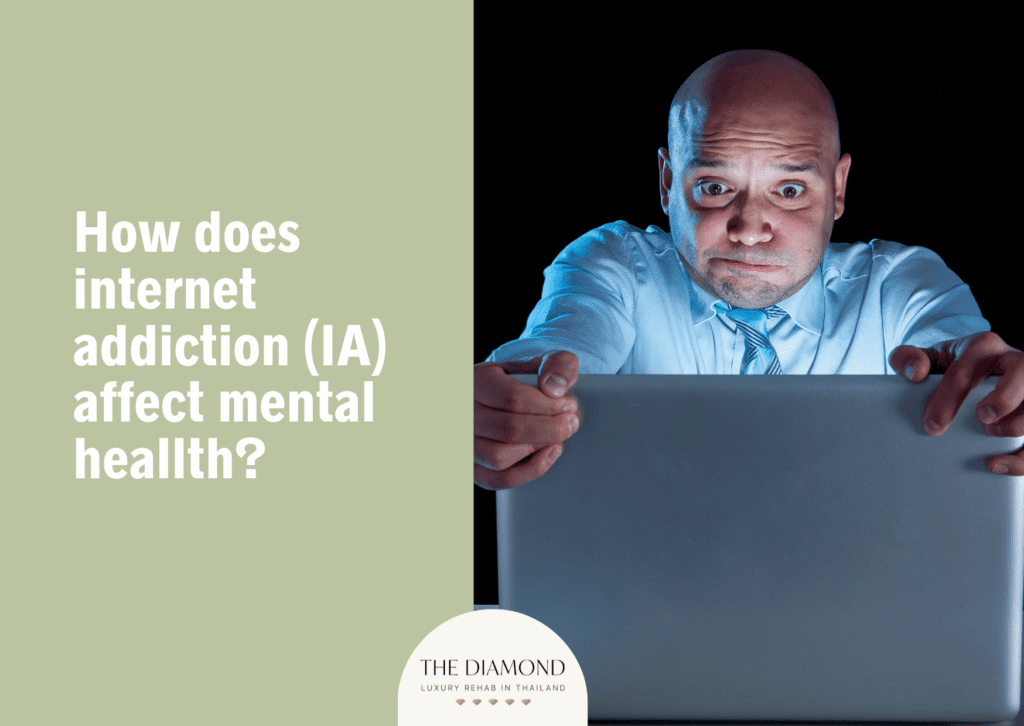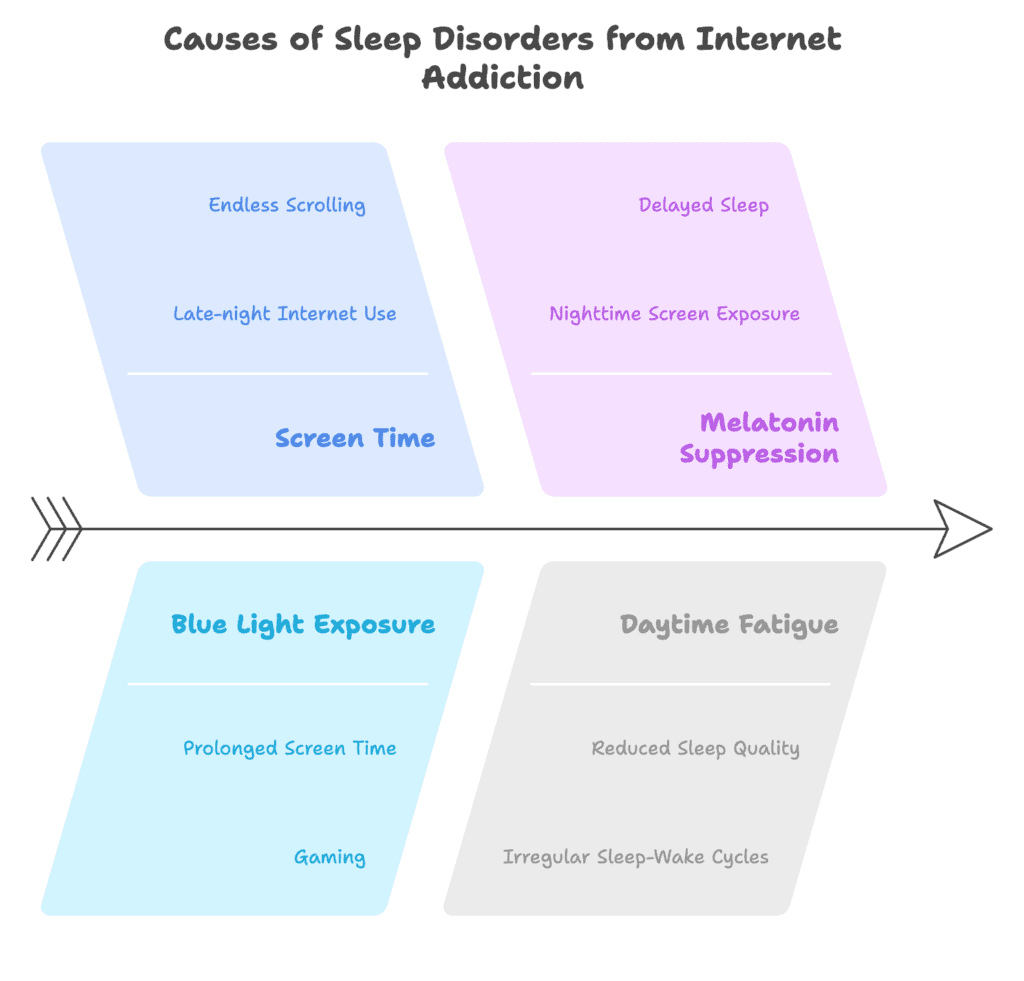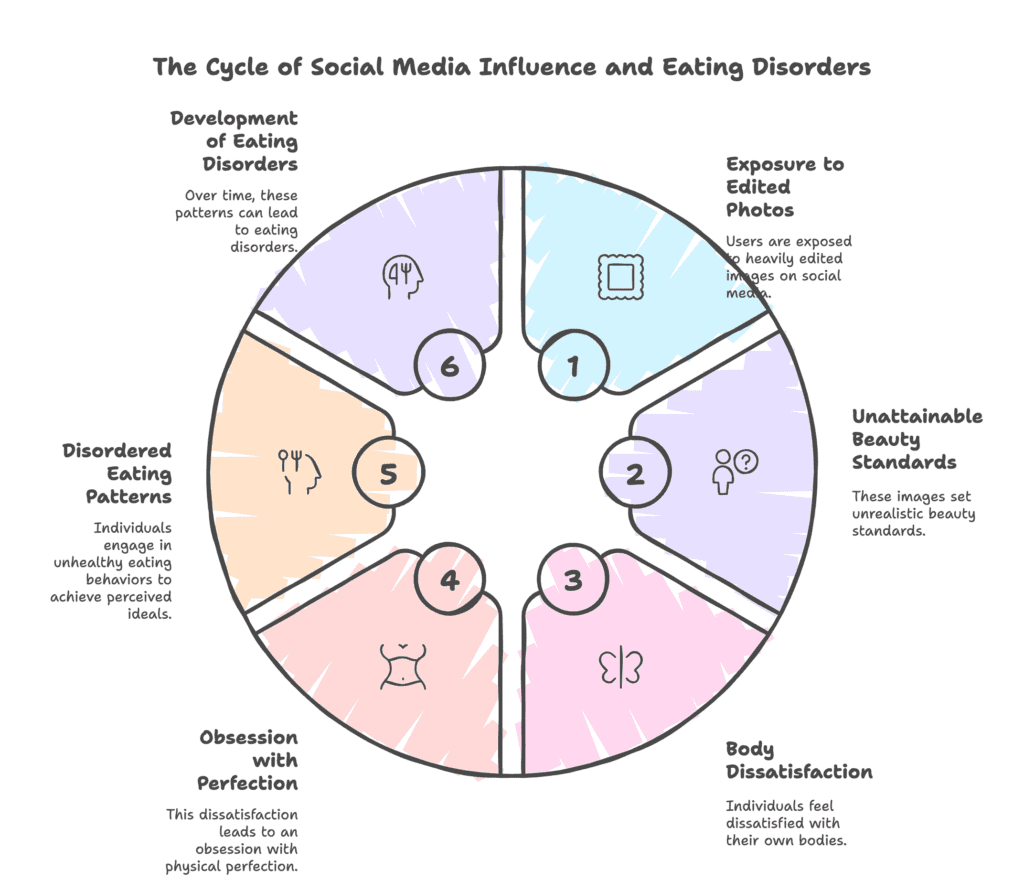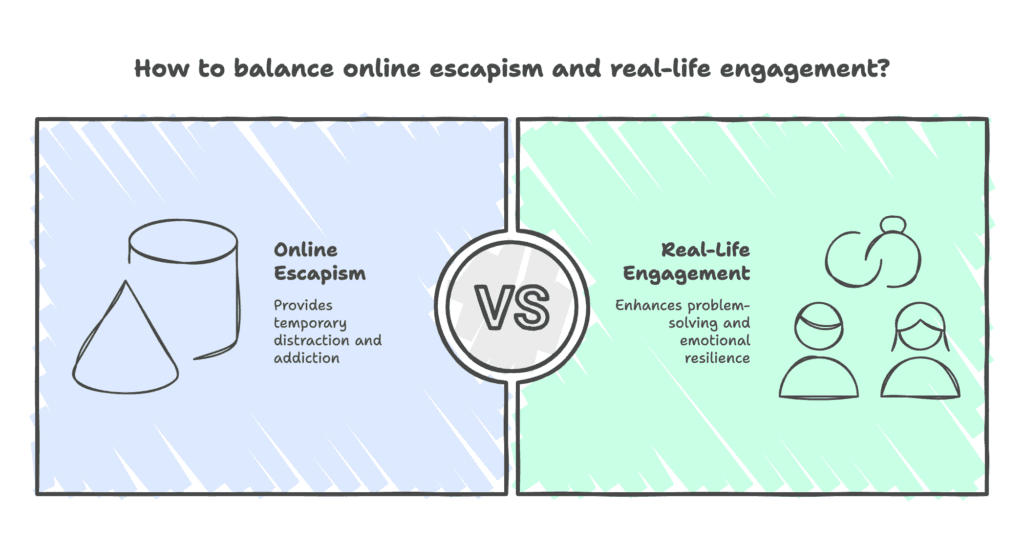How does internet addiction (IA) affect mental health?

Internet addiction harms mental health by eroding real-life relationships and exacerbating mental health issues like anxiety, depression, and psychiatric disorders. Many individuals experience low self-esteem as compulsive internet use disrupts responsibilities and personal growth.
The effects of internet addiction on mental health include depression and anxiety, financial and occupational consequences, sleep disorders, cyberbullying and online harassment, stress and overwhelm, body dysmorphia and eating disorders, substance abuse, negative self-image, attention and concentration issues, and escapism and avoidance.
How does internet addiction (IA) affect mental health?
Internet addiction (IA) affects mental health by causing anxiety, depression, and various psychiatric conditions. Social isolation, weakened in-person relationships, and an increased risk of psychosocial disorders are all consequences of excessive online activity.
Numerous individuals struggling with IA experience low self-esteem due to compulsive internet use interfering with daily responsibilities, relationships, and personal growth. Internet addiction compromises sleep patterns and promotes an inactive lifestyle, therefore aggravating emotional well-being.
The adverse consequences of too much screen time translate into less life satisfaction, since people start depending too much on virtual relationships and neglecting significant offline experiences.
What are the effects of internet addiction (IA) on mental health?

Effects of internet addiction (IA) on mental health refer to the negative psychological and emotional consequences resulting from excessive and compulsive internet use. The effects of internet addiction (IA) on mental health are listed below.
- Depression and anxiety
- Financial and occupational consequences
- Sleep disorders
- Cyberbullying and online harassment
- Stress and overwhelm
- Body dysmorphia and eating disorders
- Substance abuse
- Negative self-Image
- Attention and concentration issues
- Escapism and avoidance
1. Depression and anxiety
Depression and anxiety develop as effects of internet addiction due to excessive online engagement disrupting emotional stability and daily functioning. Prolonged screen time reduces face-to-face social interactions, leading to isolation and feelings of loneliness, contributing to depressive symptoms.
Constant exposure to unrealistic online content, cyberbullying, and social comparison fosters negative self-perception, increasing anxiety, low self-worth, and the risk of developing an anxiety disorder.
Sleep disturbances caused by late-night internet use exacerbate mood disorders, as sleep deprivation negatively affects emotional regulation. The inability to control internet use creates feelings of guilt and helplessness, reinforcing a cycle of stress, anxiety, and persistent sadness.
2. Financial and occupational consequences
Financial and occupational consequences arise from internet addiction due to excessive online engagement interfering with work responsibilities and financial management. Persistent internet use during work hours leads to distractions, resulting in decreased productivity and reduced job performance.
Frequent errors, missed deadlines, and inattention hinder professional development and sometimes result in termination or being demoted. Unchecked consumption of subscriptions, games, or online shopping adds to financial burden and creates long-term economic instability.
As people try to balance professional responsibilities with appropriate financial practices, the effect of internet addiction on financial and occupational well-being worsens over time.
3. Sleep disorders

Excessive screen time from internet addiction disorder (IAD) disrupts natural sleep patterns, leading to sleep disorders. Late-night internet use interferes with melatonin production, causing sleep disturbances and making falling or staying asleep more difficult.
Endless scrolling, gaming, or online interactions delay bedtime, reducing overall sleep quality and causing daytime fatigue. Prolonged exposure to blue light from screens further contributes to problems such as insomnia and irregular sleep-wake cycles.
According to a 2019 paper by Alimoradi et al., titled “Internet addiction and sleep problems: A systematic review and meta-analysis,” university students who engaged in problematic internet usage had a 52% increased likelihood of experiencing sleep disturbances.
Sleep disorders were threefold more prevalent among students with IA than among standard users. Melatonin suppression from screen exposure at night is potentially associated with sleep disturbances caused by IA, resulting in delayed sleep and wakefulness.
4. Cyberbullying and online harassment
Individuals are more susceptible to digital abuse because of the increased likelihood of cyberbullying and online harassment brought about by IA. Excessive time spent on social media, gaming platforms, and online forums raises the likelihood of encountering harmful interactions.
Absence of face-to-face accountability fuels aggressive conduct, resulting in public humiliation, threats, or personal attacks. An understudied yet important source of cyberbullying is gaming communities, as noted in a 2022 study by Georgios Floros and Ioanna Mylona, titled “Association of Cyberbullying and Internet Use Disorder.”
Despite efforts by game makers to curb it, toxic gaming culture is a contributing factor to bullying and harassment. Cyberbullying victimization and perpetration are linked to problematic gaming behaviors.
Individuals deeply immersed in the digital world often struggle to disengage, prolonging exposure to negativity and worsening emotional distress. Over time, repeated harassment fosters anxiety, leads to social withdrawal, and creates a diminished sense of security in online spaces.
5. Stress and overwhelm
Problematic internet use (PIU) contributes to stress and feelings of overwhelm by disrupting balance in daily life. Constant notifications, endless scrolling, and information overload keep the mind overstimulated, making relaxation difficult.
Productivity declines as online distractions interfere with responsibilities, leaving individuals feeling unaccomplished and stressed about unfinished tasks. Sleep deprivation from late-night internet use further weakens emotional resilience, making coping with daily pressures more difficult.
As digital dependence grows, the struggle to disconnect intensifies stress, creating a cycle of exhaustion and mental strain. A 2023 study by Shen et al., titled “Stress and Internet Addiction: Mediated by Anxiety and Moderated by Self-Control” found that among college students, stress is a powerful predictor of IA.
College students under a lot of stress are more prone to become addicted to the internet as a coping strategy. Anxiety rises in response to stress. IA is more likely to occur in people with higher levels of anxiety.
The research backs up the General Strain Theory, which contends that unhealthy feelings brought on by stress are what motivate problematic behaviors like internet addiction.
6. Body dysmorphia and eating disorders

IA promotes unhealthy comparisons, leading to disordered eating patterns and body dissatisfaction. Social networking sites inundate users with unattainable beauty standards, frequently endorsing heavily edited photos, and skewing ideas about what constitutes a natural appearance.
Constant exposure to such material increases the likelihood of body dysmorphic disorder since people get obsessed with perceived defects and search for means of correction of appearance.
Obsession with physical perfection contributes to eating disorders like anorexia nervosa, where individuals engage in extreme food restriction to achieve an unrealistic body shape. Bulimia nervosa becomes a risk as well, as compulsive bingeing and purging develop in response to overwhelming pressure to meet unattainable beauty ideals.
7. Substance abuse
Pathological internet use increases the risk of substance abuse by fostering isolation, stress, and unhealthy coping mechanisms. Excessive time spent online weakens real-world connections, leaving individuals feeling lonely and emotionally disconnected.
People use drugs or alcohol to cope with stress, get away from unpleasant feelings, or improve online experiences. Constant exposure to content glamorizing drug abuse normalizes addictive behaviors, making experimentation more likely.
Results of a 2013 study by Lee et al., titled “Substance abuse precedes internet addiction” found multi-substance users (including alcohol, tobacco, and drugs) were at the highest risk of developing internet addiction—a finding consistent with the notion of how drug misuse and internet addiction share common risk factors, such as novelty-seeking behaviors, stress, and impulsivity.
8. Negative self-image
Frequent internet use often distorts how individuals see themselves, leading to a negative self-image. Social media platforms showcase curated content emphasizing perfection, making real-life flaws appear more noticeable.
Repeated exposure to idealized appearances and lifestyles chips away at self-esteem, causing feelings of inadequacy. Comparison becomes a habit, reinforcing the belief that personal achievements, looks, or abilities are never enough.
Maintaining a positive view of oneself becomes more difficult when discontent increases and confidence wanes. Persistent self-doubt eventually causes anxiety and a propensity to avoid social situations. The constant need for approval from likes and comments exacerbates insecurity and feeds an ongoing cycle of mental distress.
9. Attention and concentration issues
Constant digital stimulation reduces the brain’s ability to focus, leading to attention and concentration problems. Endless notifications, rapid content consumption, and frequent multitasking train the mind to shift focus quickly, making sustained attention difficult.
Tasks requiring deep thinking become more challenging as patience and cognitive endurance decline. The inability to concentrate often results in frustration, stress, and a diminished ability to complete important tasks effectively.
Spending more time on the internet, especially while engaging in media multitasking, weakens the ability to focus and process information, as noted in a 2020 review by Firth et al., titled “Exploring the Impact of Internet Use on Memory and Attention Processes.” Even brief visits to hyperlinked websites cause a temporary drop in concentration, with effects lingering after internet use ends.
10. Escapism and avoidance

Spending long hours online often turns into a way to escape reality, offering a temporary distraction from stress and emotional struggles. Online spaces offer an alternative world where problems seem distant, reinforcing avoidance as a coping mechanism.
Addictive behaviors develop as individuals increasingly rely on digital interactions to numb discomfort or avoid real-life responsibilities. Eventually, detachment from personal challenges weakens problem-solving skills, making real-world difficulties feel overwhelming.
The more someone turns to the internet for escape, the harder confronting emotions or facing difficult situations become.

